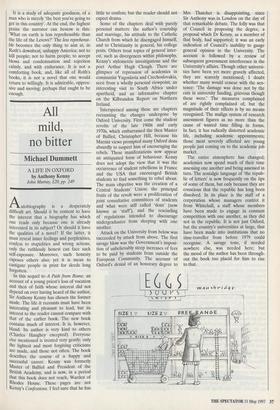All mild, no bitter
Michael Dummett
A LIFE IN OXFORD by Anthony Kenny John Murray, £20, pp. 249 Autobiography is a desperately difficult art. Should it be content to have the interest that a biography has which one reads only because one is already interested in its subject? Or should it have the qualities of a novel? If the latter, it must reveal inner feelings and perplexities, confess to stupidities and wrong actions; only the ruthlessly honest can face such self-exposure. Moreover, such honesty exposes others also; yet it is mean to castigate people in print for deeds long forgotten.
In this sequel to A Path from Rome, an account of a young priest's loss of vocation and then of faith whose interest did not depend on ever having heard of the author, Sir Anthony Kenny has chosen the former mode. The life it recounts must have been interesting and pleasant to lead, but its interest to the reader cannot compare with that of the earlier book. The new book contains much of interest. It is, however, bland. Its author is very kind to others (Charles Haughey excepted). Everyone else mentioned is treated very gently; only the lightest and most forgiving criticisms are made, and those not often. The book describes the course of a happy and successful career. Kenny was formerly Master of Balliol and President of the British Academy, and is now, in a period that this book does not reach, Warden of Rhodes House. These pages are not Kenny's Confessions. I feel sure that he has little to confess; but the reader should not expect drama.
Some of the chapters deal with purely personal matters: the author's courtship and marriage, his attitude to the Catholic Church from which he disengaged himself, and to Christianity in general, his college posts. Others treat topics of general inter- est, such as divergences within philosophy, Kenny's stylometric investigations and the poet Arthur Hugh Clough. There are glimpses of repression of academics in communist Yugoslavia and Czechoslovakia, seen from a wholly personal viewpoint, an interesting visit to South Africa under apartheid, and an informative chapter on the Kilbrandon Report on Northern Ireland.
Interspersed among these are chapters recounting the changes undergone by Oxford University. First come the student revolts of the late 1960s and early 1970s, which embarrassed the then Master of Balliol, Christopher Hill, because his Marxist views prompted many Oxford dons absurdly to suspect him of encouraging the rebels. These manifestations now appear an antiquated form of behaviour. Kenny does not adopt the view that it was the occurrence of student rebellions in France and the USA that encouraged British students to find something to rebel about. The main objective was the creation of a Central Students' Union; the principal fruits of the revolt were a proliferation of joint consultative committees of students and what were still called 'dons' (now known as 'staff), and the rescinding of regulations intended to discourage undergraduates from sleeping with one another.
Attack on the University from below was succeeded by attack from above. The first savage blow was the Government's imposi- tion of unbelievably steep increases of fees to be paid by students from outside the European Community. The account of Oxford's denial of an honorary degree to Mrs Thatcher is disappointing, since Sir Anthony was in London on the day of that remarkable debate. The folly was that of Council in proposing the degree, a proposal which Dr Kenny, as a member of that body, had supported; it was an early indication of Council's inability to gauge general opinion in the University. The account is followed by a review of subsequent government interference in the University's affairs. Though other universi- ties have been yet more gravely affected, they are scarcely mentioned; I doubt whether many would concur with the sen- tence: 'The damage was done not by the cuts in university funding, grievous though these were.' The measures complained of are rightly complained of, but the magnitude of their effects is by no means recognised. The malign system of research assessment figures as no more than the cause of wasted time filling in forms. In fact, it has radically distorted academic life, including academic appointments; those most severely affected are young people just coming on to the academic job market.
The entire atmosphere has changed; academics now spend much of their time assessing one another and being assessed in turn. The nostalgic language of 'the repub- lic of letters' is now frequently on the lips of some of them, but only because they are conscious that the republic has long been dissolved. In its place is the staff of a corporation whose managers control it from Whitehall, a staff whose members have been made to engage in constant competition with one another, as they did not in the republic. It is not just Oxford, but the country's universities at large, that have been made into institutions that no time-traveller from before 1979 could recognise. A savage tone, if needed nowhere else, was needed here; but the mood of the author has been through- out the book too placid for him to rise to that.


































































 Previous page
Previous page